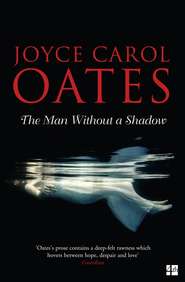По всем вопросам обращайтесь на: info@litportal.ru
(©) 2003-2024.
✖
Carthage
Автор
Год написания книги
2018
Настройки чтения
Размер шрифта
Высота строк
Поля
Did he recognize himself in the drawing?—Arlette wondered. Or were the miniature humanoid-figures too distorted, caricatured?
Zeno’s eye was for the large, blatant, blinding. Zeno had not a shrewd eye for the miniature.
Arlette slid her arm through her husband’s. Since Sunday, she was always touching him, holding him. Very still Zeno would stand at such times, not exactly responding but not stiffening either. For he dared not give in to the rawest emotion, she knew. Not quite yet.
“Whatever happened, with Cressida’s math teacher, Zeno? Remember? When she was in tenth grade? She never told me . . .”
“ ‘Rickard.’ He was her geometry teacher.”
Arlette recalled days, it might have been weeks, of veiled exchanges between Zeno and Cressida, about something that had happened, or hadn’t happened in the right way, at school. It might have been that Cressida had brought a portfolio of drawings to school—beyond that, Arlette hadn’t known.
When she’d asked Cressida what was troubling her, Cressida had told her it was none of her business; when she’d asked Zeno, he’d told her, apologetically, that it was up to Cressida—“If she wants to tell you, she will.”
Their alliance was to each other, Arlette thought.
She’d hated them, then. In just that moment.
She’d asked Juliet, out of desperation. But Juliet who wasn’t living at home at the time—who was a freshman at the State University at Oneida—had soared so far beyond her tenth-grade sister, she’d had little interest in the sister’s emotional crises—“Some teacher who didn’t appreciate her enough, I think. You know Cressida!”
Arlette didn’t, though. That was the problem.
Zeno said hesitantly, as if even now he were reluctant to violate any confidence of their daughter’s, that when Cressida had first become so interested in M. C. Escher she’d created a portfolio of pen-and-ink drawings using numerals and geometrical figures, in imitation of Escher’s lithographs.
“This one—Metamorphoses”—Zeno indicated one of the pen-and-ink drawings displayed on Cressida’s wall—“was the first one I’d seen, I think. I didn’t know what the hell to make of it, initially.” Arlette examined the drawing: it was smaller than Descending and Ascending and seemingly less ambitious: moving from left to right, human figures morphed into mannequins, then geometrical figures; then numerals, then abstract molecular designs; then back to human figures again. As the figures passed through the metamorphoses from left to right their “whiteness” shaded into “darkness”—like negatives; then, as negatives, as they passed through reverse stages of metamorphoses, they became “white” again. And some of the scenes were set on Carthage bridges, with reflections in the water that underwent metamorphoses, too.
“It’s based upon an Escher drawing of course. But how skillfully it’s executed! I remember looking at it, Metamorphoses, following with my eyes the changes in the figures, back and forth . . . It was the first time I realized, I think, that our daughter was so special. You can’t imagine Juliet doing anything like this.”
“Juliet wouldn’t want to do anything quite like this.”
“Of course. That’s my point.”
“Cressida’s drawings are like riddles. I’ve always thought it was too bad, her art is so ‘difficult.’ Remember when she was a little girl, not four years old, she drew such wonderful animals and birds with crayons. Everyone adored them. I’d always thought I might work with her, I’d thought we could create children’s books together. But . . .”
“Lettie, come on! Cressida isn’t interested in ‘children’s books’—not now, and not then. Her talent is for something more demanding.”
“But she seems to have quit doing art. There’s nothing new on the wall here, that I can see.”
“She didn’t take art courses at St. Lawrence. She said she didn’t respect the teachers. She didn’t think she could learn anything from them.”
How like Cressida! Yet she didn’t seem to have made her way otherwise.
Arlette asked what had happened with Mr. Rickard?
From time to time Arlette encountered the rabbity moustached Vance Rickard on the street in Carthage, or at the mall. Though Arlette smiled at him, and would have greeted him warmly, the high school math teacher invariably turned away without seeming to see her, frowning.
“That bastard! He’d seen some of Cressida’s drawings in her notebook, and praised her; he said he was an admirer of Escher, too. So Cressida put together a portfolio of her new work and brought it to school to show him, and the son of a bitch wounded her by saying, ‘Not bad. Pretty good, in fact. But you must be original. Escher did this first, so why copy him?’ Cressida was devastated.”
Arlette could well understand, their sensitive daughter would be devastated by such a heartless remark.
Yet, she’d wanted to ask Cressida something like this herself.
“He might have meant well. It was just—thoughtless . . . I’m sorry that Cressida was so upset.”
“That was why she did so poorly in geometry that semester. She stayed away from class, she was so ashamed. She’d ended with a barely passing grade.”
Arlette remembered: that turbulent season in their daughter’s life.
“Cressida came to me and told me what he’d said. She was utterly demolished. She said, ‘I can’t go back. I hate him. Get him fired, Daddy.’ I was furious, too. I made an appointment to speak with Rickard who professed to be totally unaware of what he’d said, or even if he’d said it; he told me that if he’d made such a remark to Cressida it must have been meant playfully. He said he’d been impressed with her drawings and with her work in his class though he worried that she was ‘inconsistent’—‘too easily discouraged.’ ”
Arlette thought yes, that is so. But Zeno was still indignant.
“I wouldn’t have tried to get the bastard fired, of course. Even if—maybe—I could have. The man was just crude, and thoughtless. Cressida changed her mind, too: ‘Maybe we should just forget about it, Daddy. I wish we would. I don’t deserve any higher grade than the one I got, really.’ But that was ridiculous, she’d certainly have earned an A, if the damned Escher misunderstanding hadn’t happened.”
Zeno didn’t need to add: Cressida’s grade-point average would have been considerably higher without a D+ in sophomore math.
For often it happened that Cressida did well in her high school courses through a semester and then, unaccountably, as if to spite her own pretensions of excellence, she failed to complete the course, or failed to study for the final exam, or even to take the final exam. She was often ill—respiratory ailments, nausea, migraine headaches. Her high school record was a zigzag fever chart that culminated in her senior year when, instead of graduating as class valedictorian, as the teachers who admired her observed to her parents, she graduated thirtieth in a class of one hundred sixteen—a dismal record for such a bright girl. Instead of being accepted at Cornell, as she’d hoped, she was fortunate to have been accepted at St. Lawrence University.
Her first year away from home, in the small college town of Canton, Cressida had been homesick, lonely; a girl who’d scorned conventional “clichéd” behavior, yet she’d found herself missing her home, the routine and safety of her home. Still, she hadn’t emailed or called her parents often and when Arlette tried to contact her, Cressida was elusive; if Arlette managed to get her to answer her cell phone, Cressida was remote, taciturn.
“Honey, is something wrong? Can you tell me? Please?” Arlette had pleaded, and Cressida had made a sound that was the verbal equivalent of a shrug. “You aren’t having trouble with your courses, are you?” Arlette asked, and Cressida said coldly, no. “Then what is it? Can’t you tell me?” Arlette asked, and Cressida said, mimicking her, “ ‘What is’—what?” Arlette had been reading about suicidally depressed undergraduates, and Cressida’s reaction worried her. (When she mentioned the subject to Zeno he’d laughed at her. “Lettie! You never fail to catastrophize.” When she’d seen a TV documentary on suicide among adolescents, in which the word epidemic was used, she dared not mention it to Zeno.)
When she returned home at winter break, and again at spring break, Cressida had been listless and withdrawn; she’d barely made the effort to visit with high school friends like Marcy Meyer who’d had to call Cressida repeatedly, and finally to come to the house to see her. She’d been stricken with fugues of depression, angry melancholy. She’d spent much of her time in her room with the door pointedly shut. While Juliet basked in the happiness of her engagement to Corporal Brett Kincaid, and the Mayfields and their friends spoke of little else except the upcoming wedding, Cressida was detached and indifferent. And when news of Brett’s injuries came, she’d said, after a moment of surprise and shock, “Well—Brett is a soldier after all and he was at war. You can’t always expect to be the one who does the killing.”
Fortunately, Cressida hadn’t made this remark within Juliet’s hearing.
When Brett re-entered their lives, however, badly damaged, initially in a wheelchair, Cressida had been visibly shocked, and subdued; her usual habit of irony was suspended.
To Arlette she said: “Juliet will never marry him now. I predict.”
Arlette, annoyed, had told Cressida that she was mistaken. She didn’t know her sister, clearly.
“Well, just wait! I predict.”
Another time, when Arlette and Cressida happened to be alone together in the house, she’d said suddenly, almost angrily: “What’s the point of all this?” and Arlette had said, “The point of all—what?” Cressida had waved her hand irritably, as if brushing away flies. “All this effort.”
As if she’d meant the entire world. And its history.
Arlette had gathered, though not directly from Cressida, that college had been a surprise to her. From earliest childhood Cressida had taken for granted her intellectual superiority and, though she’d have ridiculed the very notion, her social status as the daughter of Zeno Mayfield who’d bought for his family a handsome old Colonial on Cumberland Avenue; she’d taken for granted the very air she breathed, in her family’s house. But in Canton, amid strangers of whom many belonged to sororities and fraternities, living away from her comfortable home with no one who knew her, loved her, and fretted over her slightest whim or unhappiness, Cressida must have been unmoored: lost.
If she’d made friends, Arlette knew nothing of them. If she went without eating properly, if she stayed up through a night, if she went outdoors lightly dressed in freezing winds; if she was careless about her health, or cut classes; if she perceived herself at the edge of the university world, not by choice or design but helplessly—no one took any special notice, no one cared.
Poor Cressida! In Canton, no one even knew her as the smart one.
“When she came home from college, and was keeping to herself so much, I should have tried to talk with Cressida more. She isn’t a child technically but she has the sensitive feelings of a child. She’s never gotten over having done so poorly in high school where she should have been a star.”
Zeno spoke broodingly. Zeno’s monologues were all of Cressida now where previously, he’d been obsessively concerned with Juliet in the aftermath of the broken engagement.
A ringing phone interrupted. Zeno moved hurriedly to answer it—the Mayfield family line—in the bedroom next to Cressida’s.











